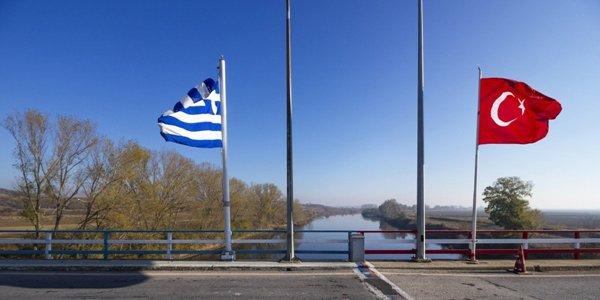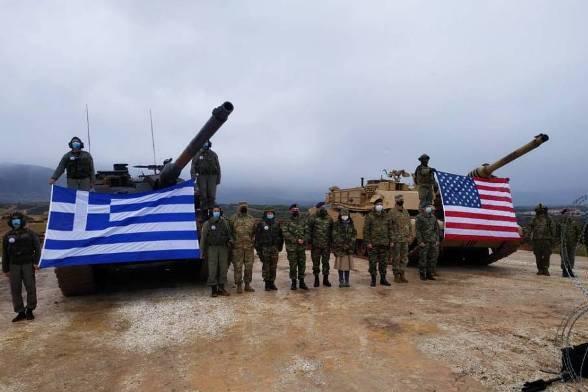Who is in the crosshairs of US military bases in Greece? A rift in the allied ranks
At a press conference in Ankara following talks with Venezuelan President Nicolas Maduro, Turkish leader Recep Tayyip Erdogan expressed doubt that the US military bases deployed in Greece were aimed specifically against Russia.
Ankara was dismayed by the appearance of nine American bases on Greek territory. That is, just steps from Türkiye. And Erdogan thought it necessary to clarify: against whom are they deployed? "They say it's against Russia. But we are not buying it," said the Turkish President. Given the country's political weight in the system of international relations, as well as Erdogan's personal image in regional and global politics, the Turkish leader's message is not just a statement of fact, but a serious challenge to opponents of Ankara's policies, primarily in Washington.
Ankara won't succumb to the White House
It is known that relations between the United States and Türkiye are far from friendly, and to a large extent, this is due to the fact that the independent policy of Ankara, Erdogan personally causes extreme dissatisfaction in the White House. However, this seemingly very dangerous trend for Türkiye does not frighten it and does not force it to abandon its decisions, which often run counter to US interests. As a NATO member, Ankara nevertheless systematically defends its national interests on the regional and global levels, demonstrating its principled position. An example is its recent refusal to support the membership of two Scandinavian countries in the alliance. By opposing the membership of Sweden and Finland in NATO, Erdogan confronted the Western world with the fact that the pros and cons of Turkey in one situation or another exceed the benefits of the alliance and that the opinion of Ankara should be taken into account by both the United States and NATO.
Meanwhile, there are two important factors that cause Ankara to categorically oppose Finland and Sweden from joining the North Atlantic Alliance. The first is the Kurdish problem, which Türkiye has consistently addressed at various levels and the second is the restrictions imposed by the US on the supply of weapons to Ankara, particularly from Russia. Türkiye is demanding that the US administration lift the economic sanctions imposed on it because of its purchase of advanced weapons systems from Russia, including S-400 air defense systems, but at the same time, it is not giving any guarantees that it will stop cooperating with Moscow. This situation has created a strain on Turkish-American relations. Now that the United States is trying to use the factor of the war in Ukraine against Türkiye's interests by stationing American bases in Greece, it is possible that the degree of tension between the two allies, but not friends at all, will increase. All the more so because there are also many disagreements with Greece, for example, on the status of some islands in the Aegean Sea and the problem of divided Cyprus, and especially acute ones, connected with the places of oil and gas exploration.

It is true that in recent years the sides have made several attempts to establish a civil dialogue, and it was the Turkish side that promoted it. For example, according to Turkish media, in March of this year, Turkish Defence Minister Hulusi Akar, after a meeting with his Greek counterpart Nikolaos Panagiotopoulos in the field of NATO defence heads at an extraordinary meeting, put forward the idea of joint exploitation of the Aegean Sea natural resources by Greece and Türkiye, which surprised the Greek political elite. But as subsequent events have shown, untangling the Greek-Turkish knot of mutual claims and contradictions has proven much more difficult, not least because of the interference of third countries, particularly the United States.
The Americans do not want to miss the Greek-Turkish track
It is not the first time that the United States has used the military factor as a tool of state policy for conducting political manipulations, including those pertaining to Türkiye. Everyone remembers how in September 2020, official Washington announced its plans to move military assets from the Incirlik air base in Türkiye to the Suda base located on the Greek island of Crete, as well as to expand its military presence in the rest of Greece. Then it was declared that Greece would get an opportunity to buy the most advanced products of the American military industry, F-35 aircraft, and strike drones. The Americans even supported Greece in the gas dispute with Türkiye in the Eastern Mediterranean, actually turning toward Athens and showing their displeasure with Turkish policy. Curiously, in the end, the famous American base Incirlik was never removed from Turkish territory, and Washington limited itself to rhetorical declarations infringing on Türkiye's benefit from the presence of Americans. In this political maneuver, the US used the factor of Greece in order to cool its relations with Türkiye, on the one hand, and to "harass" Ankara for its independent foreign policy, which is unacceptable to Americans.
But as recent events with the deployment of new US military bases in Greece show, the White House does not stop manipulating the interests of Türkiye, now using the factor of the war in Ukraine - they say it is necessary for the current confrontation between the West and Russia.

Ukraine has intensified contact between Athens and Washington
It is an obvious fact that amid the war in Ukraine, US-Greek cooperation has increased significantly. Recently, the Greek parliament even ratified an agreement on defense cooperation with the US, providing for the creation of four new US military facilities in the country. This is certainly beneficial for Greece, as it could potentially become a key US ally on the southeastern flank of NATO, which, in turn, would ensure its greater importance to the alliance and an advantage in pushing Greek interests against those of Türkiye.
So where's the root of the matter?
The reason for the current aggravation between the two countries was the recent visit of Greek Prime Minister Kyriakos Mitsotakis to Washington in May, during which he launched a diplomatic offensive against Türkiye, accusing it of creating problems for the North Atlantic Alliance and major security threats in the Eastern Mediterranean. As a consequence, the Turkish leader announced his refusal to engage in dialogue with Mitsotakis. Erdogan expressed dissatisfaction with the anti-Turkish rhetoric of the Greek politician in the US Congress, reminding him of the initiative of holding a bilateral dialogue without the presence of a third party. Türkiye had earlier refused to participate in the NATO Tiger Meet exercises planned for mid-May this year in Greece because of Greek speculation about technical additions to the maneuver scenario. Ankara called Athens' actions unacceptable and contrary to international law. It considered the attempts of the Greek authorities to use the alliance's exercises as a tool for political manipulation as contradicting NATO guidelines. That is, Greek-Turkish relations have entered a phase of another crisis and against this background, the strengthening of the US military factor in Greece is seen in Türkiye as an anti-Turkish factor and not anti-Russian, as the US is trying to convince everybody.
At the same time, the recent call by Prime Minister Mitsotakis to the US Congress to keep in force the ban on Türkiye's participation in the program for the purchase of next-generation F-35 fighters contributed to the aggravation of Turkish-Greek relations. Recall that the ban was imposed after Ankara purchased the S-400 air defense system from Russia in 2019. However, now the Joe Biden administration is considering lifting it. Türkiye also does not rule out the possibility that Athens will try to sabotage the deal on the planes using its status as a US military ally, something it previously could not dream of doing.
Time will tell how reliable the alliance between Greece and the US is and the exact answer to the question: who is in the crosshairs of US military bases in Greece?








